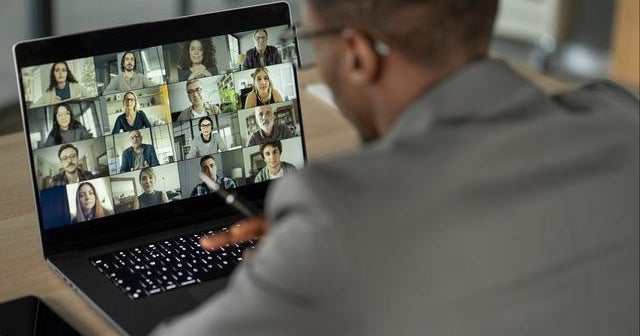Study on Zoom fatigue's health effects
Ever felt mentally or physically drained after a video conference call? You're not alone.
A recent study found a connection between video conferencing in educational settings and physical symptoms of exhaustion. Concern about the impact of so-called "Zoom fatigue" took hold as the use of video calls expanded during the COVID-19 pandemic.
In an interview with CBS News, Dr. Arjun Venkatesh, a professor and chair of emergency medicine at Yale University, called the study "small but mighty in many ways."
The study focused on 35 college students split into two groups — half of them watched a lecture live and the other half got it over video conference. All participants wore EEG and EKG monitors to measure the electrical activity in the brain and their heart rate, respectively.
"What they found is something new," Venkatesh explained. "It wasn't just that on surveys people reported fatigue after having the video, but it was actually true based on their physiology, they could measure it in the brainwaves. They could see it in their heart rate. They were more inattentive, they were more sad and they reported more fatigue."
What is Zoom fatigue?
At its simplest level, Venkatesh says Zoom fatigue is something most people have likely experienced in the past — that exhausted feeling you get after you've been on Zoom call after Zoom call.
"But scientifically, what we find is that people will report feelings like sadness, feeling fed up, feeling very tired," he says. "And we know based on these measurements of heart activity and brain activity that the brain actually slows down a little bit, that the heart rate goes up and down. There's more signs of stress on the body."
According to research from Stanford University, video calls can also lead to fatigue due to:
- Intense, excessive close-up eye contact
- Seeing yourself during video chats
- Reduction in mobility
- Higher cognitive load
"It's both the science of our body as well as how we're feeling at the same time," Venkatesh adds.
How can you prevent Zoom fatigue?
Since the study focused on college students in lectures, it may not be as applicable to video conferences in other settings like the workplace. However, Venkatesh says there are some things you can do to make smarter choices during your work day.
"There's times when you may be in an office setting and you have the chance to choose between the Zoom meeting or doing it in person but walking down the hall — choose the latter," he suggests.
You can also make an effort to schedule breaks between your video meetings.
"Stacking those meetings back to back so that there's no break, no chance for the brain to recharge, the heart to relax again, probably makes this these kinds of symptoms worse," he says. "So making those smart choices within a workday can really help people maybe mitigate or prevent some of these symptoms."
- More tips: Suffering from "Zoom fatigue"? Try this fix.
- Women experience higher levels of "Zoom fatigue" than men, study finds
- In:
- Mental Health
- Zoom
Sara Moniuszko is a health and lifestyle reporter at CBSNews.com. Previously, she wrote for USA Today, where she was selected to help launch the newspaper's wellness vertical. She now covers breaking and trending news for CBS News' HealthWatch.
Thanks for reading CBS NEWS.
Create your free account or log in
for more features.
